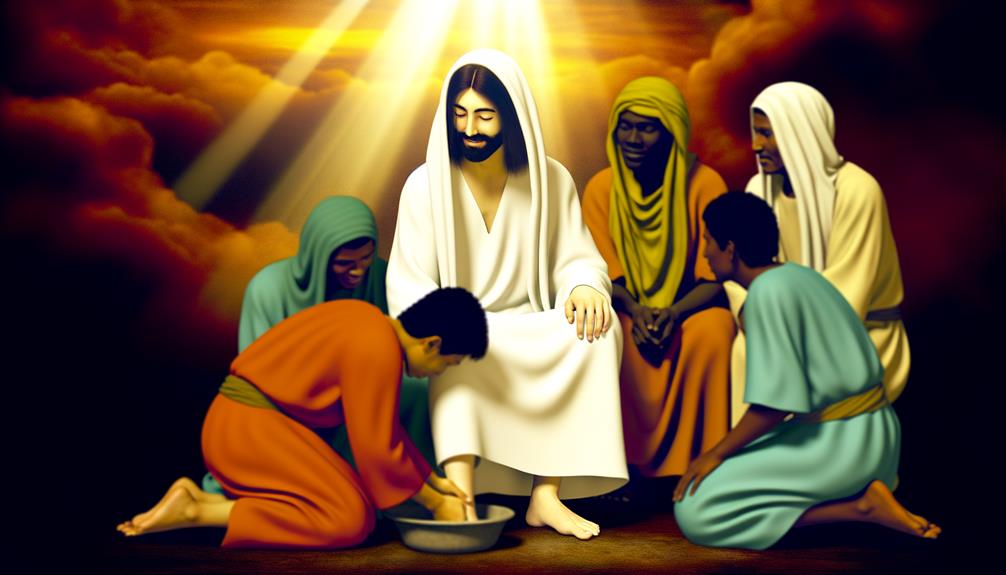Types of Love and Their Meaning in the Bible: Explained
In the Bible, love manifests in four distinct forms—agape, phileo, storge, and eros. Agape is the highest form; it’s unconditional and selfless, exemplified by Jesus’ sacrifice.
Phileo denotes brotherly love, fostering deep emotional bonds and mutual respect, as seen in the relationships of David and Jonathan. Storge describes natural familial affection, showcased in the loyalty within families like Naomi and Ruth.
Eros is romantic love, characterized by passion and commitment in marriage, reflecting God’s covenantal love. Each type guides our understanding of love’s depth and calls for deeper relational and spiritual connection.
Through these, one appreciates the multifaceted nature of biblical love.

Key Takeaways
- Agape: The highest form of love, characterized by selflessness, sacrifice, and unconditional commitment, as exemplified by Jesus’ sacrifice on the cross.
- Phileo: Brotherly love that fosters deep emotional bonds, mutual respect, and loyalty, illustrated by the relationships of David and Jonathan and Jesus with His disciples.
- Storge: Familial love representing natural affection within family units, highlighted by biblical stories like Noah’s Ark and Joseph’s forgiveness of his brothers.
- Eros: Romantic love encompassing passion and desire within marriage, emphasizing commitment, emotional connection, and reflecting God’s passionate love for humanity.
Agape: Unconditional Love

Agape, often referred to as unconditional love, is the highest form of love depicted in the Bible, characterized by its selflessness and unwavering commitment.
I see agape as the essence of serving others without expecting anything in return. This love transcends emotions and personal gain, reflecting a divine quality that calls us to serve humanity.
Analyzing scripture, I notice that agape is consistently demonstrated through acts of kindness, sacrifice, and a deep concern for the well-being of others. For instance, Jesus’ sacrifice on the cross epitomizes agape, illustrating ultimate love and service.
Embracing agape challenges us to act selflessly, prioritize others’ needs, and commit to fostering a community grounded in unconditional love and mutual respect.
Phileo: Brotherly Love

When I consider Phileo, or brotherly love, I’m struck by its profound significance in fostering deep, emotional bonds between individuals.
Biblical examples, such as the relationship between David and Jonathan, illustrate its powerful role in forming loyal and affectionate connections.
Understanding Phileo within Christian relationships highlights its essential function in creating a supportive and cohesive community.
Meaning of Phileo
Phileo, derived from the Greek word for brotherly love, encapsulates the deep affection and companionship shared among friends and family. This form of love is characterized by mutual respect, shared values, and the joy found in each other’s company.
Analyzing Phileo, I see it as a relational glue that binds us in community, fostering a sense of belonging and trust. It’s not just a passive feeling but an active choice to engage, support, and uplift those around us.
In serving others, Phileo challenges me to prioritize relationships, to offer empathy and understanding, and to create a nurturing environment where everyone feels valued. This love reinforces the importance of human connections in our spiritual and daily lives.
Biblical Examples of Phileo
In exploring the richness of Phileo, we find numerous biblical narratives that vividly illustrate this form of brotherly love through the lives of key figures. These examples highlight the deep, emotional connections that can inspire us to serve others more profoundly.
Consider:
- David and Jonathan: Their bond transcended political rivalry, exemplifying loyalty and sacrifice.
- Ruth and Naomi: Ruth’s unwavering dedication to Naomi showcases Phileo as a commitment that goes beyond obligation.
- Jesus and His Disciples: Jesus’ relationship with His disciples was marked by mutual respect and heartfelt guidance.
Each of these relationships demonstrates Phileo as a dynamic force, urging us to cultivate genuine, compassionate connections in our own lives.
The biblical portrayal of Phileo invites us to embrace and nurture brotherly love with sincerity and devotion.
Phileo in Christian Relationships
Recognizing Phileo in Christian relationships compels us to reflect on how brotherly love can shape and enhance our communal and personal bonds.
Phileo, as illustrated in Scripture, emphasizes mutual affection, emotional warmth, and support among believers. It’s more than just friendship; it’s a deep, heartfelt connection that fosters unity and collective growth.
In practicing Phileo, we’re called to genuinely care for one another, share burdens, and celebrate joys. This form of love strengthens our faith communities, creating an environment where everyone feels valued and supported.
By embodying Phileo, we fulfill Christ’s command to love one another, reflecting God’s love in our interactions.
Consequently, Phileo becomes an essential aspect of living out our faith authentically and joyfully.
Storge: Familial Love

Storge, the Greek term for familial love, encapsulates the deep, natural affection found within family units, as exemplified in various biblical narratives. This love is evident in the care and commitment seen in the relationships between parents, children, and siblings.
For those who seek to serve others, understanding Storge is essential, as it highlights the foundation of nurturing and support vital for a thriving community.
Consider these biblical examples:
- Noah’s Ark: Noah’s dedication to saving his family demonstrates profound Storge.
- Ruth and Naomi: Their loyalty and mutual care reveal the strength of familial bonds.
- Joseph and His Brothers: Despite betrayal, Joseph’s forgiveness showcases enduring familial love.
Storge motivates us to prioritize family, offering a model for selfless, unwavering support.
Eros: Romantic Love

When examining Eros, or romantic love, I observe its portrayal as a powerful force encompassing passion and desire.
This form of love is most clearly sanctioned within the context of marriage, highlighting the importance of commitment.
Additionally, the intimacy and union between partners underscore the profound emotional and spiritual connection that characterizes Eros.
Passion and Desire
Exploring the concept of Eros in the Bible reveals the profound depth and complexity of romantic love as both a divine gift and a human experience. Eros encompasses passion and desire, evoking feelings that are intense and sometimes overwhelming. The eros love definition in the Bible highlights not only the beauty of romantic attraction but also the spiritual connection that can accompany such feelings. This intertwining of the physical and the spiritual suggests that Eros is not merely about physical desire, but also about a longing for deep relational union that reflects God’s love for humanity.
In examining biblical texts, I find that Eros is:
- A reflection of God’s own passionate love for humanity, inspiring us to love deeply and earnestly.
- A source of profound joy and fulfillment, enhancing our lives with meaning and connection.
- A reminder of our vulnerability, urging us to approach romantic love with humility and respect.
These elements highlight the richness of Eros, urging us to comprehend its spiritual dimensions while recognizing its impact on our lives and relationships.
Marriage and Commitment
Recognizing the intense emotions of Eros, we see how these passionate feelings lay the foundation for the enduring commitments found within marriage. Eros, or romantic love, isn’t merely about fleeting passion but serves as a catalyst for deeper bonds.
In the Bible, Eros is illustrated through the love stories of couples like Jacob and Rachel, signifying how romantic attraction evolves into lifelong partnership. This love requires active dedication and mutual respect, reflecting God’s covenant with His people.
Intimacy and Union
Eros, the passionate and often tumultuous form of love, plays an essential role in fostering intimacy and union between partners within the biblical narrative. This form of love emphasizes physical attraction and emotional connection, serving as a powerful catalyst for deepening relational bonds. In the Bible, Eros is seen not merely as a physical impulse but as a divine gift that can lead to spiritual and emotional growth.
Reflecting on Eros, we can see its impact in three profound ways:
- Strengthening Marital Bonds: Eros enhances commitment and resilience in marriage.
- Encouraging Vulnerability: It invites partners to share their innermost selves.
- Reflecting Divine Love: Eros mirrors the passionate love God has for humanity.
Biblical Examples of Agape

One of the most profound examples of agape in the Bible is found in the sacrificial love of Jesus Christ, who gave His life for humanity’s redemption. This ultimate act of selflessness embodies agape, defined by unconditional, self-giving love. Jesus’ actions reflect a love not based on merit but on grace and compassion.
Another notable instance is God’s enduring patience with the Israelites, despite their recurrent disobedience. This divine forbearance underscores agape as a steadfast, sacrificial love that seeks the best for others, often at great personal cost.
These biblical examples challenge us to emulate such love in our lives, prioritizing the well-being of others above our own desires and comforts.
Expressions of Phileo

Phileo, often translated as brotherly love, finds its expressions in the deep, personal bonds shared between friends and family members throughout the Bible. This type of love isn’t just sentiment; it’s demonstrated through meaningful actions and commitments.
Consider these three examples:
- David and Jonathan: Their friendship exemplifies unwavering loyalty and sacrifice, even in the face of political danger.
- Ruth and Naomi: Ruth’s devotion to Naomi showcases a love that transcends cultural boundaries and personal loss.
- Jesus and His Disciples: Jesus’ interactions with His disciples reflect a deep, nurturing relationship that goes beyond mere companionship.
Analyzing these examples, I see that Phileo encourages us to cultivate relationships that embody loyalty, sacrifice, and mutual support, reflecting a profound commitment to serving others.
Storge in Scripture

In examining Storge, the affection found within familial relationships, we find numerous biblical narratives that highlight this natural, enduring love.
For instance, the bond between Noah and his family in Genesis exemplifies Storge, where love manifests through mutual support and protection during the flood.
Another poignant example is the relationship between Mary and Martha with their brother Lazarus in John 11, showcasing familial care and concern.
This foundational love also underpins the loyalty Ruth demonstrates to Naomi, seen in her unwavering commitment in Ruth 1.
These stories illustrate that Storge isn’t merely emotional but deeply practical, fostering environments where service and care thrive.
Conclusion
In exploring the diverse types of love in the Bible, I’ve come to see them as the threads in a rich tapestry, each with its unique hue and texture.
Agape’s selflessness, Phileo’s camaraderie, Storge’s loyalty, and Eros’s passion all interweave to form the fabric of human relationships.
By understanding these loves, we gain deeper insight into God’s intentions for us, illuminating the path to living a life imbued with profound, multifaceted love.






